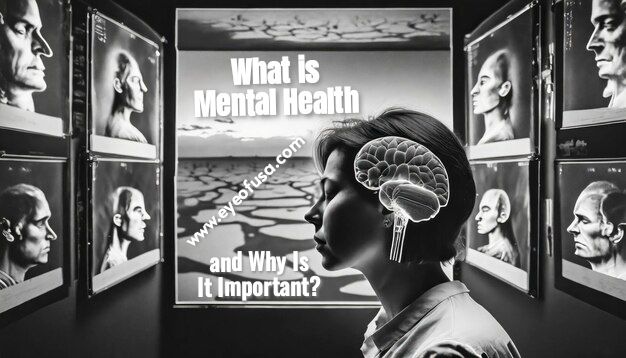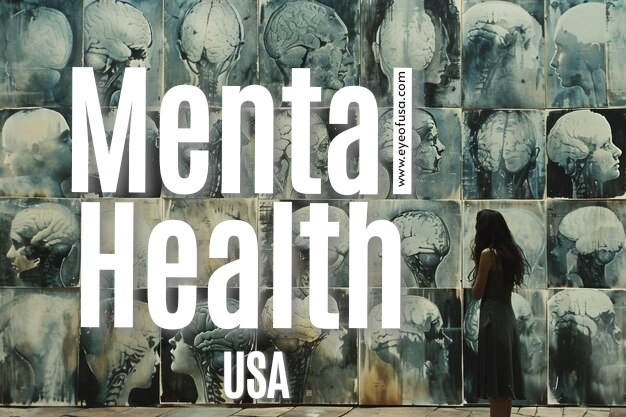Mental Health: A Comprehensive Guide
Published on Eye of USA
Mental health plays a vital role in our overall well-being, yet it’s often overlooked. At Eye of USA, we’re committed to breaking the stigma and providing accessible information on this critical aspect of health. In this article, we’ll explore what mental health means, common disorders, and practical ways to improve your mental wellness.
1. What is Mental Health and Why Is It Important?

Mental health refers to our emotional, psychological, and social well-being. It influences how we think, feel, and behave. It also determines how we handle stress, relate to others, and make decisions. Mental health is important at every stage of life, from childhood to adulthood.
Why is mental health essential for everyday life?
Good mental health is crucial because it affects every part of our daily life—from relationships and productivity to physical health. Poor mental health can lead to issues like anxiety, depression, and even physical illness.
2. Common Mental Health Disorders
Mental health disorders are more common than most people realize. Some of the most prevalent ones include:
- Anxiety Disorders: Characterized by excessive worry or fear.
- Depression: A persistent feeling of sadness or loss of interest.
- Post-Traumatic Stress Disorder (PTSD): A condition triggered by a traumatic event.
- Bipolar Disorder: Causes extreme mood swings, from highs (mania) to lows (depression).
What are the symptoms of mental health disorders?
Symptoms can vary depending on the disorder but generally include mood changes, social withdrawal, fatigue, and difficulty concentrating.
3. Factors That Impact Mental Health
Several factors contribute to mental health problems:
- Biological Factors: Genetics and brain chemistry can play a role.
- Environmental Factors: Stress from work, trauma, or a toxic social environment.
- Lifestyle Factors: Lack of sleep, poor diet, and substance abuse can worsen mental health.
How do lifestyle choices affect mental health?
Your daily habits, such as eating a balanced diet, exercising regularly, and getting enough sleep, have a direct impact on your mental well-being. For example, physical activity releases endorphins that help reduce stress and improve mood.
4. The Importance of Mental Health Awareness
Mental health awareness is essential for several reasons:
- Reducing Stigma: Many people with mental health issues don’t seek help because of social stigma.
- Open Conversations: Encouraging discussions can help people understand they’re not alone.
- Impact on Productivity: Good mental health boosts focus, creativity, and overall job performance.
How can we raise mental health awareness?
Promoting mental health education in schools, workplaces, and social media can help people understand and support those dealing with mental health issues.
5. Tips for Maintaining Good Mental Health
Maintaining mental wellness requires proactive habits. Here are some practical tips:
- Mindfulness and Meditation: Taking a few minutes a day to focus on your breathing can reduce stress.
- Exercise: Physical activity isn’t just for your body; it also boosts mental health.
- Diet: A balanced diet with plenty of fruits, vegetables, and whole grains supports brain health.
- Sleep: Quality sleep is essential for mental clarity and emotional stability.
- Social Connections: Maintaining healthy relationships can help reduce feelings of isolation.
What are easy ways to improve mental health?
Start by setting small, achievable goals—whether it’s a 10-minute walk daily, cutting back on junk food, or reaching out to a friend for support.
6. Seeking Professional Help for Mental Health
If your mental health is affecting your daily life, it’s crucial to seek professional help. Mental health professionals such as psychiatrists, psychologists, and counselors can offer various types of therapy:
- Cognitive Behavioral Therapy (CBT): Helps change negative thought patterns.
- Psychotherapy: Focuses on understanding deep-rooted issues.
- Group Therapy: Provides support from others facing similar challenges.
When should I see a mental health professional?
If you’re experiencing persistent symptoms like sadness, anxiety, or social withdrawal that last more than two weeks, it’s a good idea to seek professional help.
7. Mental Health Resources
There are numerous resources available for those seeking help:
- National Suicide Prevention Lifeline: 1-800-273-TALK (8255) for immediate assistance.
- Mental Health Apps: Tools like Headspace or Calm offer daily mental health support.
- Educational Platforms: Websites such as MentalHealth.gov provide useful information and guides.
What mental health resources are available online?
In addition to hotlines, there are numerous apps and platforms that offer everything from daily meditation exercises to direct counseling services, accessible at your fingertips.
8. Conclusion
Mental health should be a priority, just like physical health. By understanding mental health disorders, recognizing their symptoms, and incorporating healthy habits, you can improve your overall well-being. Whether it’s reaching out to a professional or using mindfulness techniques, taking small steps can make a significant difference.
Remember, Eye of USA is here to guide you through every step toward better mental health. Stay informed, seek help when needed, and never underestimate the importance of mental wellness.
FAQs
What is mental health?
Mental health encompasses our emotional, psychological, and social well-being, affecting how we think, feel, and behave.
How can I improve my mental health?
You can improve mental health by practicing mindfulness, exercising regularly, maintaining social connections, and seeking professional help when necessary.
When should I seek professional help for mental health?
If symptoms like persistent sadness, anxiety, or withdrawal last longer than two weeks and affect your daily life, it’s time to consult a mental health professional.
Thanks for be with us 🙃😇🤗🥰🥰


Unlock a world of opportunity with our exclusive LinkedIn database, 750 million expert users segmented by country, complete with phone numbers, emails, Facebook, Twitter links. Grow your business and connect with top talent today DataDrivenGrowth
Contacts:
https://www.linkedin.com/in/anatoliy-barsukov-52194bb4/
Tel/Viber/WhatsApp:
+79818525114
Skype anato27